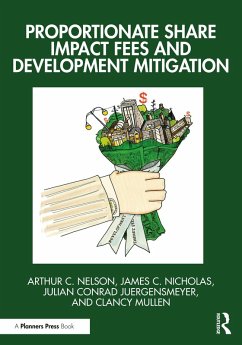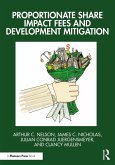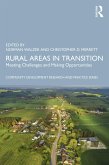Arthur C. Nelson, James C. Nicholas, Julian Conrad Juergensmeyer, Clancy Mullen
Proportionate Share Impact Fees and Development Mitigation (eBook, ePUB)
48,95 €
48,95 €
inkl. MwSt.
Sofort per Download lieferbar

24 °P sammeln
48,95 €
Als Download kaufen

48,95 €
inkl. MwSt.
Sofort per Download lieferbar

24 °P sammeln
Jetzt verschenken
Alle Infos zum eBook verschenken
48,95 €
inkl. MwSt.
Sofort per Download lieferbar
Alle Infos zum eBook verschenken

24 °P sammeln
Arthur C. Nelson, James C. Nicholas, Julian Conrad Juergensmeyer, Clancy Mullen
Proportionate Share Impact Fees and Development Mitigation (eBook, ePUB)
- Format: ePub
- Merkliste
- Auf die Merkliste
- Bewerten Bewerten
- Teilen
- Produkt teilen
- Produkterinnerung
- Produkterinnerung

Bitte loggen Sie sich zunächst in Ihr Kundenkonto ein oder registrieren Sie sich bei
bücher.de, um das eBook-Abo tolino select nutzen zu können.
Hier können Sie sich einloggen
Hier können Sie sich einloggen
Sie sind bereits eingeloggt. Klicken Sie auf 2. tolino select Abo, um fortzufahren.

Bitte loggen Sie sich zunächst in Ihr Kundenkonto ein oder registrieren Sie sich bei bücher.de, um das eBook-Abo tolino select nutzen zu können.
This book is the third in a series of impact fee guidebooks for practitioners. It is divided into four parts with the 1st reviewing policy and legal foundations, the 2nd detailing the planning, calculation, and implementation requirements, the 3rd exploring economic, ethical, and equity implications, and the 4th presenting case studies.
- Geräte: eReader
- ohne Kopierschutz
- eBook Hilfe
- Größe: 6.37MB
Andere Kunden interessierten sich auch für
![Proportionate Share Impact Fees and Development Mitigation (eBook, PDF) Proportionate Share Impact Fees and Development Mitigation (eBook, PDF)]() Arthur C. NelsonProportionate Share Impact Fees and Development Mitigation (eBook, PDF)48,95 €
Arthur C. NelsonProportionate Share Impact Fees and Development Mitigation (eBook, PDF)48,95 €![The Routledge Handbook on Greening High-Density Cities (eBook, ePUB) The Routledge Handbook on Greening High-Density Cities (eBook, ePUB)]() The Routledge Handbook on Greening High-Density Cities (eBook, ePUB)46,95 €
The Routledge Handbook on Greening High-Density Cities (eBook, ePUB)46,95 €![Routledge Handbook of University-Community Partnerships in Planning Education (eBook, ePUB) Routledge Handbook of University-Community Partnerships in Planning Education (eBook, ePUB)]() Routledge Handbook of University-Community Partnerships in Planning Education (eBook, ePUB)45,95 €
Routledge Handbook of University-Community Partnerships in Planning Education (eBook, ePUB)45,95 €![Rural Areas in Transition (eBook, ePUB) Rural Areas in Transition (eBook, ePUB)]() Rural Areas in Transition (eBook, ePUB)37,95 €
Rural Areas in Transition (eBook, ePUB)37,95 €![Planning, Sustainable Urbanisation and the Commonwealth (eBook, ePUB) Planning, Sustainable Urbanisation and the Commonwealth (eBook, ePUB)]() Planning, Sustainable Urbanisation and the Commonwealth (eBook, ePUB)39,95 €
Planning, Sustainable Urbanisation and the Commonwealth (eBook, ePUB)39,95 €![The Routledge Handbook of Planning Megacities in the Global South (eBook, ePUB) The Routledge Handbook of Planning Megacities in the Global South (eBook, ePUB)]() The Routledge Handbook of Planning Megacities in the Global South (eBook, ePUB)46,95 €
The Routledge Handbook of Planning Megacities in the Global South (eBook, ePUB)46,95 €![Teaching Landscape History (eBook, ePUB) Teaching Landscape History (eBook, ePUB)]() Teaching Landscape History (eBook, ePUB)39,95 €
Teaching Landscape History (eBook, ePUB)39,95 €-
-
-
This book is the third in a series of impact fee guidebooks for practitioners. It is divided into four parts with the 1st reviewing policy and legal foundations, the 2nd detailing the planning, calculation, and implementation requirements, the 3rd exploring economic, ethical, and equity implications, and the 4th presenting case studies.
Dieser Download kann aus rechtlichen Gründen nur mit Rechnungsadresse in A, B, BG, CY, CZ, D, DK, EW, E, FIN, F, GR, HR, H, IRL, I, LT, L, LR, M, NL, PL, P, R, S, SLO, SK ausgeliefert werden.
Produktdetails
- Produktdetails
- Verlag: Taylor & Francis
- Seitenzahl: 562
- Erscheinungstermin: 30. November 2022
- Englisch
- ISBN-13: 9781000782936
- Artikelnr.: 66023145
- Verlag: Taylor & Francis
- Seitenzahl: 562
- Erscheinungstermin: 30. November 2022
- Englisch
- ISBN-13: 9781000782936
- Artikelnr.: 66023145
- Herstellerkennzeichnung Die Herstellerinformationen sind derzeit nicht verfügbar.
Arthur C. Nelson, PhD, FAcSS, FAICP, is emeritus Professor of Urban Planning, Real Estate Development, and Geography at the University of Arizona, as well as emeritus Presidential Professor of City and Metropolitan Planning at the University of Utah, where he was also Adjunct Professor of Finance. He has authored more than 20 books and more than 300 other publications. Recent books include Foundations of Real Estate Development Financing, Reshaping Metropolitan America; The TDR Handbook (with Julian Conrad Juergensmeyer and James C. Nicholas), and the critically acclaimed Megapolitan America (with Robert E. Lang). Nelson's expert testimony helped frame urban sprawl as a legal concept in Florida, guide the Georgia Supreme Court to establish affordable housing case law, and support the rationale used by the US Supreme Court when it established the "rough proportionality" exaction doctrine in Dolan v. City of Tigard, 512 U.S. 374.
James C. Nicholas, PhD, is emeritus Professor of Urban and Regional Planning and emeritus affiliate Professor of Law at the University of Florida. He has written widely on the subject of land, environmental policy, and growth management. Nicholas has authored eight books, three monographs, and over 60 articles in the professional literature, dealing primarily with growth and local governmental finance of infrastructure. He is author of The Calculation of Proportionate-Share Impact Fees, the American Planning Association's first impact fee guide. Nicholas is also co-author of A Guide to Impact fees and Housing Affordability (with Julian Conrad Juergensmeyer and Arthur C. Nelson), editor of The Changing Structure of Infrastructure Finance, and author of State Regulation and Housing Prices. Together with Juergensmeyer, he pioneered the Rational Nexus Test, which has become the guiding principle for development mitigation such as impact fees in the United States.
Julian Conrad Juergensmeyer, a BA and JD graduate of Duke University and a member of the Ohio Bar, is emeritus Professor and emeritus Ben F. Johnson, Jr. Chair in Law at Georgia State University, where he served as Co-Director of the Center for the Comparative Study of Metropolitan Growth and Editor in Chief of the Journal of Comparative Urban Law and Policy. He was also Adjunct Professor in City and Regional Planning at the Georgia Institute of Technology and is emeritus Professor of Law at the University of Florida. Juergensmeyer is the co-author of the widely cited Land Use Planning and Development Regulation Law; Impact Fees: Principles and Practice of Proportionate Share Development Fees (with Nelson and Nicholas); and over 100 other books and articles. He has consulted with local governments and attorneys on matters relating to impact fees and other infrastructure finance policies as well as development mitigation in 29 states.
Clancy Mullen, AICP, is president of Duncan Associates. Having prepared more than 300 impact fee studies, he is one of the nation's foremost authorities on professional impact fee practice. Prior to joining Duncan Associates, Mullen served as a zoning planner for Austin. He is a contributing author to two American Planning Association publications, Principles and Practice of Proportionate-Share Development Fees and Growth Management Principles and Practice. He is also a co-founder of the National Impact Fee Roundtable (now the Growth and Infrastructure Consortium).
James C. Nicholas, PhD, is emeritus Professor of Urban and Regional Planning and emeritus affiliate Professor of Law at the University of Florida. He has written widely on the subject of land, environmental policy, and growth management. Nicholas has authored eight books, three monographs, and over 60 articles in the professional literature, dealing primarily with growth and local governmental finance of infrastructure. He is author of The Calculation of Proportionate-Share Impact Fees, the American Planning Association's first impact fee guide. Nicholas is also co-author of A Guide to Impact fees and Housing Affordability (with Julian Conrad Juergensmeyer and Arthur C. Nelson), editor of The Changing Structure of Infrastructure Finance, and author of State Regulation and Housing Prices. Together with Juergensmeyer, he pioneered the Rational Nexus Test, which has become the guiding principle for development mitigation such as impact fees in the United States.
Julian Conrad Juergensmeyer, a BA and JD graduate of Duke University and a member of the Ohio Bar, is emeritus Professor and emeritus Ben F. Johnson, Jr. Chair in Law at Georgia State University, where he served as Co-Director of the Center for the Comparative Study of Metropolitan Growth and Editor in Chief of the Journal of Comparative Urban Law and Policy. He was also Adjunct Professor in City and Regional Planning at the Georgia Institute of Technology and is emeritus Professor of Law at the University of Florida. Juergensmeyer is the co-author of the widely cited Land Use Planning and Development Regulation Law; Impact Fees: Principles and Practice of Proportionate Share Development Fees (with Nelson and Nicholas); and over 100 other books and articles. He has consulted with local governments and attorneys on matters relating to impact fees and other infrastructure finance policies as well as development mitigation in 29 states.
Clancy Mullen, AICP, is president of Duncan Associates. Having prepared more than 300 impact fee studies, he is one of the nation's foremost authorities on professional impact fee practice. Prior to joining Duncan Associates, Mullen served as a zoning planner for Austin. He is a contributing author to two American Planning Association publications, Principles and Practice of Proportionate-Share Development Fees and Growth Management Principles and Practice. He is also a co-founder of the National Impact Fee Roundtable (now the Growth and Infrastructure Consortium).
PART 1: POLICY RATIONALE AND LEGAL FOUNDATIONS 1. The Past, Present, and
Future of Impact Fees 2. Legal Foundations 3. State Impact Fee Legislation
4. A Tale of Two States: Texas and Georgia Impact Fee Legislation Compared
5. National Impact Fee Survey PART 2: FOUNDATIONS OF PLANNING, CALCULATION,
AND IMPLEMENTATION 6. In Accordance with the Plan 7. Impact Fee Methodology
8. Model Proportionate Share Impact Fee Ordinance 9. A Word about
Independent Studies, Exemptions, and Waivers PART 3: EFFICIENCY, ETHICS,
EQUITY, POLICY: OPTIONS AND INTERNATIONAL PERSPECTIVES 10. Evaluation of
Impact Fees against Public Finance Criteria Douglass B. Lee 11. Impacts of
Proportionate-Share Development Fees Gregory Burge and Trey Dronyk-Trosper
12. Toward a Supply-Side Theory of Development Impact Mitigation 13. Good
Planning, Value-Added Planning, and Value Capture 14. Ethical Issues in the
Use of Impact Fees to Finance Community Growth Timothy Beatley 15. The
Ethics of Impact Fee Equity Mary Kay Peck Delk and Susan A. Wood Chapter 15
Coda. A Standard of Professional Practice for Proportionate Share
Mitigation Fees Mary Kay Peck Delk, Julian Conrad Juergensmeyer, Clancy
Millen, Arthur C. Nelson, James C. Nicholas, and Susan A. Wood 16. The
Option of Impact Fees 17. Impact Fees in an International Context:
Comparisons and Similar Fiscal Tools David Amborski PART 4: INNOVATIONS IN
PRACTICE 18. A Framework for Estimating Multimodal Transportation Impacts
for Sustainable Development Kristina M. Currans and Kelly J. Clifton 19.
Mobility Fees Jonathan Paul 20. Operations and Maintenance Mitigation Fees
and Transportation Utility Fees with Implications for Improving Impact
Mitigation 21. Parking In-Lieu Fee Incentivizes Development in Downtown
Oxnard, California Alison Bouley 22. A Rational Nexus Approach Supporting
Development Mitigation to Increase Workforce Housing Supply 23.
Innovations in Impact Fee Adjustments to Advance Housing Affordability 24.
Western Placer County Habitat Conservation Fee Robert Spencer 25. Flexible
Development Funding for Large Scale Development Alison Bouley 26.
Residential and Nonresidential School Impact Fees: Case Study of Fremont
High School District, California J. Richard Recht 27. Parks and Recreation
Impact Fees for Residential and Nonresidential Development: Case Study of
Tucson, Arizona Carson Bise 28. Water Impact Fees for Residential
Development Based on House Size: Case Study of Bozeman, Montana Carson Bise
29. Transportation Impact Fees Scaled to Residential Unit Size in Tucson,
Arizona Carson Bise 30. Impact Fee Focus Groups: Case Study of Town of
Queen Creek, Arizona Kevin Burnett EPILOGUE: COMMENTARY BY JIM NICHOLAS
Future of Impact Fees 2. Legal Foundations 3. State Impact Fee Legislation
4. A Tale of Two States: Texas and Georgia Impact Fee Legislation Compared
5. National Impact Fee Survey PART 2: FOUNDATIONS OF PLANNING, CALCULATION,
AND IMPLEMENTATION 6. In Accordance with the Plan 7. Impact Fee Methodology
8. Model Proportionate Share Impact Fee Ordinance 9. A Word about
Independent Studies, Exemptions, and Waivers PART 3: EFFICIENCY, ETHICS,
EQUITY, POLICY: OPTIONS AND INTERNATIONAL PERSPECTIVES 10. Evaluation of
Impact Fees against Public Finance Criteria Douglass B. Lee 11. Impacts of
Proportionate-Share Development Fees Gregory Burge and Trey Dronyk-Trosper
12. Toward a Supply-Side Theory of Development Impact Mitigation 13. Good
Planning, Value-Added Planning, and Value Capture 14. Ethical Issues in the
Use of Impact Fees to Finance Community Growth Timothy Beatley 15. The
Ethics of Impact Fee Equity Mary Kay Peck Delk and Susan A. Wood Chapter 15
Coda. A Standard of Professional Practice for Proportionate Share
Mitigation Fees Mary Kay Peck Delk, Julian Conrad Juergensmeyer, Clancy
Millen, Arthur C. Nelson, James C. Nicholas, and Susan A. Wood 16. The
Option of Impact Fees 17. Impact Fees in an International Context:
Comparisons and Similar Fiscal Tools David Amborski PART 4: INNOVATIONS IN
PRACTICE 18. A Framework for Estimating Multimodal Transportation Impacts
for Sustainable Development Kristina M. Currans and Kelly J. Clifton 19.
Mobility Fees Jonathan Paul 20. Operations and Maintenance Mitigation Fees
and Transportation Utility Fees with Implications for Improving Impact
Mitigation 21. Parking In-Lieu Fee Incentivizes Development in Downtown
Oxnard, California Alison Bouley 22. A Rational Nexus Approach Supporting
Development Mitigation to Increase Workforce Housing Supply 23.
Innovations in Impact Fee Adjustments to Advance Housing Affordability 24.
Western Placer County Habitat Conservation Fee Robert Spencer 25. Flexible
Development Funding for Large Scale Development Alison Bouley 26.
Residential and Nonresidential School Impact Fees: Case Study of Fremont
High School District, California J. Richard Recht 27. Parks and Recreation
Impact Fees for Residential and Nonresidential Development: Case Study of
Tucson, Arizona Carson Bise 28. Water Impact Fees for Residential
Development Based on House Size: Case Study of Bozeman, Montana Carson Bise
29. Transportation Impact Fees Scaled to Residential Unit Size in Tucson,
Arizona Carson Bise 30. Impact Fee Focus Groups: Case Study of Town of
Queen Creek, Arizona Kevin Burnett EPILOGUE: COMMENTARY BY JIM NICHOLAS
PART 1: POLICY RATIONALE AND LEGAL FOUNDATIONS 1. The Past, Present, and
Future of Impact Fees 2. Legal Foundations 3. State Impact Fee Legislation
4. A Tale of Two States: Texas and Georgia Impact Fee Legislation Compared
5. National Impact Fee Survey PART 2: FOUNDATIONS OF PLANNING, CALCULATION,
AND IMPLEMENTATION 6. In Accordance with the Plan 7. Impact Fee Methodology
8. Model Proportionate Share Impact Fee Ordinance 9. A Word about
Independent Studies, Exemptions, and Waivers PART 3: EFFICIENCY, ETHICS,
EQUITY, POLICY: OPTIONS AND INTERNATIONAL PERSPECTIVES 10. Evaluation of
Impact Fees against Public Finance Criteria Douglass B. Lee 11. Impacts of
Proportionate-Share Development Fees Gregory Burge and Trey Dronyk-Trosper
12. Toward a Supply-Side Theory of Development Impact Mitigation 13. Good
Planning, Value-Added Planning, and Value Capture 14. Ethical Issues in the
Use of Impact Fees to Finance Community Growth Timothy Beatley 15. The
Ethics of Impact Fee Equity Mary Kay Peck Delk and Susan A. Wood Chapter 15
Coda. A Standard of Professional Practice for Proportionate Share
Mitigation Fees Mary Kay Peck Delk, Julian Conrad Juergensmeyer, Clancy
Millen, Arthur C. Nelson, James C. Nicholas, and Susan A. Wood 16. The
Option of Impact Fees 17. Impact Fees in an International Context:
Comparisons and Similar Fiscal Tools David Amborski PART 4: INNOVATIONS IN
PRACTICE 18. A Framework for Estimating Multimodal Transportation Impacts
for Sustainable Development Kristina M. Currans and Kelly J. Clifton 19.
Mobility Fees Jonathan Paul 20. Operations and Maintenance Mitigation Fees
and Transportation Utility Fees with Implications for Improving Impact
Mitigation 21. Parking In-Lieu Fee Incentivizes Development in Downtown
Oxnard, California Alison Bouley 22. A Rational Nexus Approach Supporting
Development Mitigation to Increase Workforce Housing Supply 23.
Innovations in Impact Fee Adjustments to Advance Housing Affordability 24.
Western Placer County Habitat Conservation Fee Robert Spencer 25. Flexible
Development Funding for Large Scale Development Alison Bouley 26.
Residential and Nonresidential School Impact Fees: Case Study of Fremont
High School District, California J. Richard Recht 27. Parks and Recreation
Impact Fees for Residential and Nonresidential Development: Case Study of
Tucson, Arizona Carson Bise 28. Water Impact Fees for Residential
Development Based on House Size: Case Study of Bozeman, Montana Carson Bise
29. Transportation Impact Fees Scaled to Residential Unit Size in Tucson,
Arizona Carson Bise 30. Impact Fee Focus Groups: Case Study of Town of
Queen Creek, Arizona Kevin Burnett EPILOGUE: COMMENTARY BY JIM NICHOLAS
Future of Impact Fees 2. Legal Foundations 3. State Impact Fee Legislation
4. A Tale of Two States: Texas and Georgia Impact Fee Legislation Compared
5. National Impact Fee Survey PART 2: FOUNDATIONS OF PLANNING, CALCULATION,
AND IMPLEMENTATION 6. In Accordance with the Plan 7. Impact Fee Methodology
8. Model Proportionate Share Impact Fee Ordinance 9. A Word about
Independent Studies, Exemptions, and Waivers PART 3: EFFICIENCY, ETHICS,
EQUITY, POLICY: OPTIONS AND INTERNATIONAL PERSPECTIVES 10. Evaluation of
Impact Fees against Public Finance Criteria Douglass B. Lee 11. Impacts of
Proportionate-Share Development Fees Gregory Burge and Trey Dronyk-Trosper
12. Toward a Supply-Side Theory of Development Impact Mitigation 13. Good
Planning, Value-Added Planning, and Value Capture 14. Ethical Issues in the
Use of Impact Fees to Finance Community Growth Timothy Beatley 15. The
Ethics of Impact Fee Equity Mary Kay Peck Delk and Susan A. Wood Chapter 15
Coda. A Standard of Professional Practice for Proportionate Share
Mitigation Fees Mary Kay Peck Delk, Julian Conrad Juergensmeyer, Clancy
Millen, Arthur C. Nelson, James C. Nicholas, and Susan A. Wood 16. The
Option of Impact Fees 17. Impact Fees in an International Context:
Comparisons and Similar Fiscal Tools David Amborski PART 4: INNOVATIONS IN
PRACTICE 18. A Framework for Estimating Multimodal Transportation Impacts
for Sustainable Development Kristina M. Currans and Kelly J. Clifton 19.
Mobility Fees Jonathan Paul 20. Operations and Maintenance Mitigation Fees
and Transportation Utility Fees with Implications for Improving Impact
Mitigation 21. Parking In-Lieu Fee Incentivizes Development in Downtown
Oxnard, California Alison Bouley 22. A Rational Nexus Approach Supporting
Development Mitigation to Increase Workforce Housing Supply 23.
Innovations in Impact Fee Adjustments to Advance Housing Affordability 24.
Western Placer County Habitat Conservation Fee Robert Spencer 25. Flexible
Development Funding for Large Scale Development Alison Bouley 26.
Residential and Nonresidential School Impact Fees: Case Study of Fremont
High School District, California J. Richard Recht 27. Parks and Recreation
Impact Fees for Residential and Nonresidential Development: Case Study of
Tucson, Arizona Carson Bise 28. Water Impact Fees for Residential
Development Based on House Size: Case Study of Bozeman, Montana Carson Bise
29. Transportation Impact Fees Scaled to Residential Unit Size in Tucson,
Arizona Carson Bise 30. Impact Fee Focus Groups: Case Study of Town of
Queen Creek, Arizona Kevin Burnett EPILOGUE: COMMENTARY BY JIM NICHOLAS







